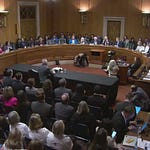Potential Inefficiencies and Wasteful Spending Highlighted in the Federal Register (September 19, 2024)
A review of the September 19, 2024, Federal Register excerpts reveals several potential areas of government inefficiency and wasteful spending.
Overly Broad Application of the Priority Review Voucher Program (FDA). While the Priority Review Voucher Program incentivizes the development of treatments for underserved areas like tropical diseases and rare pediatric conditions, its application to "material threat medical countermeasures" raises concerns about potential mission creep and wasteful spending [1]. The inclusion of such a broad category could divert resources from more pressing public health needs. A government watchdog might question the necessity and cost-effectiveness of granting expedited review for drugs or biologics falling under this vaguely defined category.
Potential for Redundancy and Overlap in Pedestrian Safety Standards (Department of Transportation). The proposed rule to implement a domestic FMVSS No. 228 for pedestrian safety, while aiming to reduce pedestrian injuries and fatalities, might create redundancy and overlap with the existing New Car Assessment Program (NCAP) [2, 3]. The proposed rule acknowledges that NCAP already incorporates pedestrian safety tests, albeit not as stringent as those outlined in the proposed FMVSS No. 228. A government watchdog could argue that enhancing and expanding NCAP's pedestrian safety testing protocols, rather than introducing a new FMVSS, might be a more efficient use of resources. The proposed rule's reliance on UNECE's Global Technical Regulation No. 9 as a model for the domestic standard [4] further raises questions about potential duplication and whether such alignment is necessary or even beneficial.
Lack of Clarity Regarding "Government Astronaut" Definition (FAA). The final rule amending the Commercial Space Launch Competitiveness Act introduces modified financial responsibility requirements related to "Government astronauts" and "International partner astronauts" [5]. This differentiation implies a need for precise definitions to avoid ambiguity and potential financial loopholes. Without clear guidelines, determining financial responsibility for missions involving astronauts of varying designations could become complex and open to interpretation, potentially leading to disputes and delays. A government watchdog might call for greater clarity in defining these terms to ensure accountability and prevent unintended financial burdens on taxpayers.
Recommendations:
The FDA should clearly define "material threat medical countermeasures" within the context of the Priority Review Voucher program and establish transparent criteria for determining eligibility to prevent misuse and ensure that the program prioritizes truly neglected areas of drug development.
The Department of Transportation should conduct a thorough analysis comparing the costs and benefits of implementing FMVSS No. 228 versus strengthening and expanding NCAP's pedestrian safety testing protocols. This analysis should consider factors such as regulatory burden, industry compliance costs, and the potential for achieving comparable safety outcomes through existing programs.
The FAA should provide clear and comprehensive definitions of "Government astronaut" and "International partner astronaut" within the Commercial Space Launch Competitiveness Act. These definitions should address potential ambiguities regarding nationality, mission objectives, and funding sources to ensure consistent application of financial responsibility requirements.
Urgent and High-Impact Items in the Federal Register (September 19, 2024)
The provided excerpts from the September 19, 2024, Federal Register contain several notices and proposed rules with potentially significant and time-sensitive impacts.
Here are some key examples:
Fee Rate for Priority Review Vouchers (FDA). The notice announcing the Fiscal Year (FY) 2025 fee rate for using Priority Review Vouchers will significantly impact pharmaceutical companies developing treatments for tropical diseases, rare pediatric conditions, and material threat medical countermeasures [1]. These vouchers, awarded upon FDA approval of qualifying drugs or biologics, grant expedited review for a subsequent application, potentially bringing treatments to market faster [2]. The notice highlights that the fee, set at $2,482,446 for FY 2025, is determined annually based on the difference in FDA review costs between priority and standard applications [3, 4]. This fee directly affects the cost of drug development and could influence research priorities within the pharmaceutical industry.
Pedestrian Safety Standards (Department of Transportation). The proposed rule concerning pedestrian safety standards, particularly the potential introduction of a domestic FMVSS No. 228, has substantial implications for vehicle manufacturers, safety advocates, and the general public [5]. This rule explores adopting stricter pedestrian safety standards, potentially aligning with the UNECE's Global Technical Regulation No. 9, to reduce pedestrian injuries and fatalities [5]. The proposed rule outlines extensive research, testing methodologies, and cost-benefit analyses related to pedestrian impacts with vehicle hoods [6, 7]. The implementation of such a standard would necessitate design changes in new vehicles and potentially impact manufacturing costs and consumer prices.
Safety Zone Due to Tropical Storm Francine (Coast Guard). A temporary rule establishes a safety zone in Southeast Texas in response to the immediate threat of Tropical Storm Francine [8]. The Coast Guard cites "good cause" under 5 U.S.C. 553(b)(B) to bypass the typical notice and comment period for rulemaking, emphasizing the need for "prompt action" to address safety hazards [8]. This urgency underscores the immediate impact of severe weather events on maritime safety and the regulatory mechanisms used to protect life and property.
These examples demonstrate how the Federal Register serves as a platform for enacting time-sensitive regulations and announcing policies with potentially significant and immediate consequences for various stakeholders.
Regulations an Average American Might Find Obscure
The sources, which consist of excerpts from the September 19, 2024, Federal Register, contain numerous regulations and notices that the average American might find obscure. Some examples include:
Technical specifications for pedestrian head protection in vehicle safety standards. The proposed rule to establish a Federal Motor Vehicle Safety Standard (FMVSS) No. 228 for pedestrian head protection includes detailed technical specifications and testing procedures that are likely unfamiliar to most people. These include defining reference lines on a vehicle's hood, establishing Headform Test Areas, and specifying impact points for testing. [1-3] Images within the document even illustrate these complex concepts, further highlighting the specialized knowledge required to fully grasp this regulation. [4, 5]
Rules governing airspace designations near Anchorage, Alaska. The Federal Aviation Administration (FAA) published a correction notice for airspace designations near Anchorage. This notice details changes to Jet Routes and Area Navigation Routes, including specific coordinates and altitudes that are likely irrelevant to the average person's air travel experiences. [6]
Amendments to the Commercial Space Launch Competitiveness Act. The FAA also published a final rule incorporating changes mandated by the Commercial Space Launch Competitiveness Act. This rule introduces definitions for terms like "Government astronaut," "International partner astronaut," and "International Space Station Intergovernmental Agreement," and modifies financial responsibility requirements related to these definitions. [7-9] While this Act has implications for the future of space travel, its details are likely not widely understood by the public.
Technical specifications for the labeling of braille audio cassette players. The sources include a notice regarding proposed changes to the regulations for labeling requirements of braille audio cassette players. [10] While these requirements are intended to ensure accessibility for people with visual impairments, the specific details and technical language used would likely be difficult for the average person to understand.
Rules governing the closure of specific fishing areas off the coast of Alaska. The National Oceanic and Atmospheric Administration (NOAA) issued temporary rules closing certain areas to fishing. These rules, driven by conservation efforts, pertain to "Atka Mackerel in the Central Aleutian District" and "'Other Rockfish' in the Aleutian Islands Subarea," designations that are likely unfamiliar to those outside the fishing industry. [11, 12]
These obscure regulations, while potentially important for their respective areas, highlight the often complex and highly specialized nature of the Federal Register's contents.
A Government Watchdog's Review of the Federal Register (September 19, 2024)
This report identifies potential areas of government inefficiency, wasteful spending, and overly burdensome regulations based on the September 19, 2024, edition of the Federal Register.
Examples of Regulations an Average American Might Find Obscure
The intricacies of airspace designations, such as the correction to Jet Route J-133 and the establishment of Area Navigation Route Q-801 near Anchorage, Alaska, might seem obscure to the average American [1]. While important for aviation safety and efficiency, the technical details within these regulations are likely irrelevant to the daily lives of most citizens.
Similarly, the amendments to the regulations surrounding the Commercial Space Launch Competitiveness Act might appear complex and removed from everyday concerns [1]. Concepts like "Government astronaut" definitions and financial responsibility requirements for suborbital launch vehicles, while crucial for the growing commercial space sector, are likely not easily understood by the general public.
Urgent and High-Impact Items
The notice regarding the FY 2025 Fee Rate for Priority Review Vouchers has significant implications for drug development and public health [2]. This fee, determined by the FDA, directly impacts the cost of bringing new drugs, particularly for tropical diseases, rare pediatric conditions, and material threat medical countermeasures, to market [2].
The proposed rule from the Department of Transportation regarding pedestrian safety standards, specifically the potential implementation of a domestic FMVSS No. 228, will have substantial long-term consequences for vehicle manufacturers and public safety [3]. This rule aims to adopt stricter pedestrian safety standards, potentially mirroring the UNECE's Global Technical Regulation No. 9 [3].
Potential Inefficiencies and Wasteful Spending Identified in the Federal Register
The publication and distribution practices of the Federal Register itself warrant scrutiny. While the Federal Register provides a vital service in publishing federal regulations and notices, the subscription and single-issue costs outlined raise concerns about potential waste [4]. For example, the high price of a single copy, ranging from $11 to $33 depending on the page count, seems excessive, particularly considering the availability of a free online edition [4].
The Federal Register Printing Savings Act of 2017 aimed to reduce printing costs by restricting the automatic distribution of printed copies to Congress and federal offices [5]. However, the provision allowing for printed copies upon request raises concerns about potential overspending. Without robust oversight and a clear understanding of the demand for printed copies, this exception to the Act could undermine its cost-saving intent.
Recommendations:
Agencies should strive to present information, particularly complex regulations, in a way that is easily understandable to the average American. Using plain language, providing clear summaries, and offering accessible explanations of technical jargon would increase transparency and public engagement.
A thorough review of the Federal Register's printing and distribution practices is recommended to identify cost-saving measures. This review should include an analysis of the demand for printed copies, the cost-effectiveness of various distribution channels, and the potential for increased utilization of the free online edition.
A comprehensive assessment of the exceptions granted under the Federal Register Printing Savings Act of 2017 is necessary to ensure that the Act effectively achieves its intended goal of reducing printing costs. Stricter criteria for fulfilling requests for printed copies, coupled with regular monitoring of printing expenditures, could further reduce waste.













Share this post